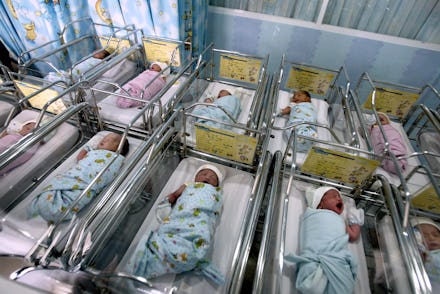Science Has Good News for People Who Aren't in a Rush to Have Kids

To the mother or well-meaning coworker who's ever pressured you about having kids, tell them this: Waiting can actually be a great thing.
A recent study from the London School of Economics and the University of Western Ontario found that parents who have their first child at an older age have a notably more positive response to the birth. Published in the journal Demography, the research showed that "older parents, between the ages of 35 to 49, have the strongest happiness gains around the time of birth and stay at a higher level of happiness after becoming parents."
The first child in particular, the study found, brings more happiness than a third or fourth, likely due to the novelty of a first or second child or the pressures and strains a third child can put on a family. But that first-child happiness is even more acute for older parents, said study co-author Mikko Myrskylä. "The older you were when you had your first child, the stronger the happiness response was," he said.
Of course, having children at an older age isn't always a conscious decision. A 2014 Pew report pointed out that Americans are marrying later in life, some pushing back the age of first child for some. (Though not all; the study also noted that there are more parents than ever cohabiting and raising children outside of marriage).
For other parents, it's not a choice: Having children later isn't about getting a late start to marriage but rather fertility challenges. According to the CDC, about 11% of American women ages 15 to 44 have trouble getting pregnant or carrying a pregnancy to term. Those difficulties increase with age, as about one-third of couples where the woman is older than 35 experience fertility problems, problems which could also lie with the man and his sperm.
Then there are women who choose wait because, thanks to medical advances, they can. Apple and Google's recent addition of egg-freezing to its female employees' benefits packages highlighted just how commonplace it's become for women to delay (or at least consider delaying) pregnancy by choice.
This new study indicates that those women or couples who choose to wait win out in the end. Dr. Myrskylä and co-author Dr. Rachel Margolis, who conducted their research on German and British parents, told the New York Times that the results depend on where parents live, as different societies can "support childbearing in different ways."
But a society that doesn't pressure women to have children and allows for them to control their childbearing to the utmost degree, whether through egg-freezing or family planning, will inevitably lead to happier parents once those babies do come around.
In the meantime, you can send studies like this to your nagging parents.